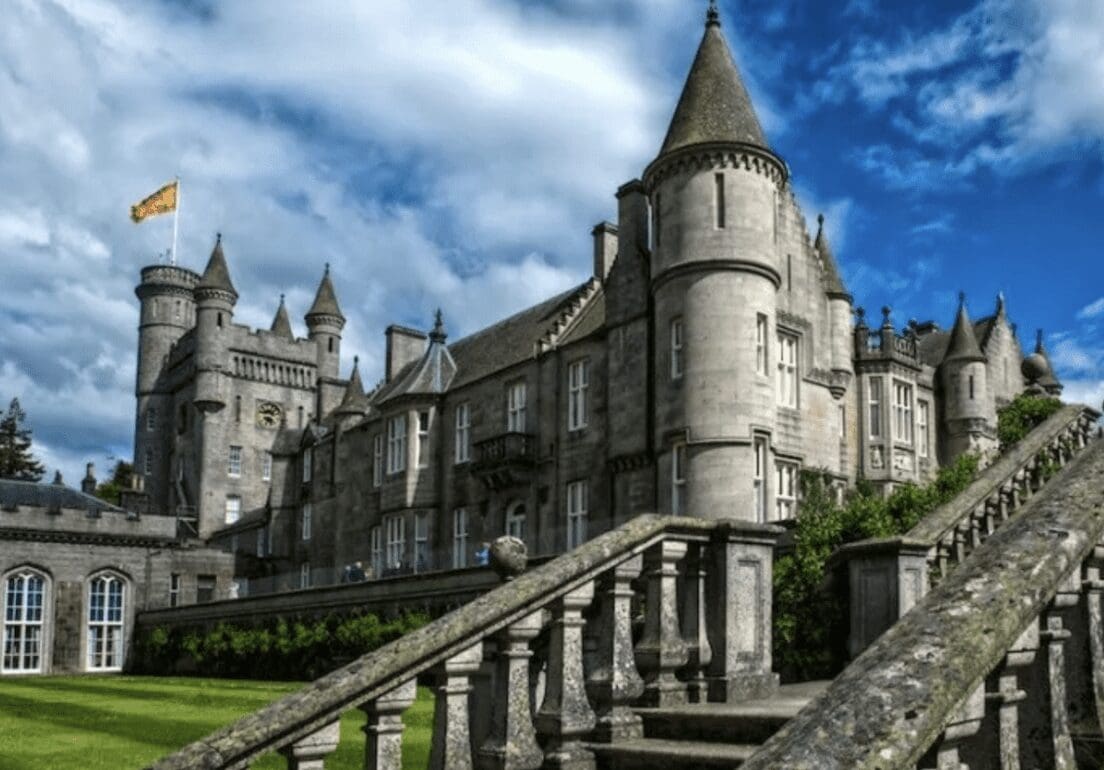Search Posts
Recent Posts
- It is what it is – Jen Brien April 24, 2024
- Time for Sour Grapes – Tim Jones April 24, 2024
- Tenor and Pianist, Michael DiMucci: Songs From the Heart at Linden Place Mansion April 24, 2024
- World War II Veteran, Louis Dolce, turns 100 – TODAY April 24, 2024
- Rhode Island Weather for April 24, 2024 – John Donnelly April 24, 2024
Categories
Subscribe!
Thanks for subscribing! Please check your email for further instructions.

Long live King Charles – have we lost his princely activism for traditional architecture? – David Brussat
by David Brussat, Architecture Here and There
Photo: Balmoral Castle, where Queen Elizabeth died and Prince Charles succeeded her as king.
Anglophilia runs deep in this corner. Not because Great Britain has a royal family but because it has embraced Western civilization more than any nation. This fact explains its reign as Europe’s most powerful and influential country for centuries, nationally and globally, up to the middle of the 20th century.
To a degree, Queen Elizabeth II presided over Britain’s decline – its loss of its colonies (a mixed blessing), its weakness in international affairs (even if it still punches above its weight), and the decline of its politics, culture and socio-economic conditions have degraded British life in recent decades more than necessitated by its decline in national power and global influence.
The queen was not to blame for this. Britain’s monarchy grew far more nominal in the 20th century, but that process had been ongoing since the Magna Carta in the 13th century. Elizabeth’s role as queen for 70 years avoided a much more dire situation for Britain through her dignity and her persistence in upholding British traditions.
As the British writer Theodore Dalrymple wrote in City Journal:
Her conduct was as modest as her position was exalted. She never made the mistake of thinking that she was an interesting or remarkable person in herself, and thereby became remarkable.
Margaret Thatcher’s prime ministership in the 1980s served to strengthen the monarchy by blocking political tendencies toward socialism that the queen was largely powerless to address. This could have rendered the monarchy even more nugatory, or ended it altogether. The “awokening” of British politics, culture and society in the past decade has arguably deranged British national life even more than it has that of the United States.
It is expected by many that Charles’s assumption of the throne might deepen these dangerous trends. But the worst of them – wokeism, climate alarmism, and Muslim immigration and refusal to assimilate – are too deeply ingrained by now to require assistance from a king so limited in his political authority.
That leaves many in Britain and overseas to wonder what will become of the former prince’s powerful activism in the important realm of architecture. In 1984, when he was still almost four decades from reigning as king, Charles as the Prince of Wales began his crusade against modern architecture.
In a brave lecture to the Royal Institute of British Architects upon its 150th anniversary, Charles stated that a proposed addition to the National Gallery on London’s Trafalgar Square would be “a monstrous carbuncle on the face of a much-loved and elegant friend.” Way to slam dunk that gauntlet!
In 1987, to a national meeting of town planners, Charles added: “You have to give this much to the Luftwaffe: when it knocked down our buildings it didn’t replace them with anything more offensive than rubble. We did that.” The BBC called this speech “one of the most outspoken speeches ever made by a member of the royal family.″
These two statements by the prince, along with others, furiously rattled the gilt cages of the modernist architectural establishment (probably even more insular than in America), but created a swelling of hope in the large majority of publics on both sides of the pond, who prefer traditional architecture by a large margin but feel ignored and powerless to influence the appearance of where they live.
Prince Charles may have waxed and waned in his vocal denunciation of modern architecture, but he has persisted in his institutional activism. He created the Prince’s Foundation and other institutes to promote traditional architecture, historic preservation, town planning and the survival of rural and farm life. He has lent his name and influence to similar causes around the world. In an act perhaps more “outspoken” than all of these wrapped together, he oversaw the development of a new town – beautiful and successful – called Poundbury. The architecture critics hate it but the public loves it.
Charles’s persistence in this very important matter tests the limits of the role of the British constitutional monarchy. Royals are not allowed to commit politics, as it were, but there is some wiggle room at the intersection of convention and precedent. Walter Bagehot (1826-1877) declared that “the sovereign has, under a constitutional monarchy … three rights – the right to be consulted, the right to encourage, the right to warn.”
What can – what will – Charles make of this?
Charles may consult his own precedent and build his own convention, to the extent that his will permits. Does he have the right to sit by and watch in silence as his country founders in a miasma of its own making? Or might his role permit him to express himself on issues of vital importance that rise, more or less, above politics? The power of the people to deliberate democratically the quality of their own built environment might be such an issue – one less fraught with danger to constitutional prerogatives than other issues facing this sceptered isle. In such a manner might a long-arising crisis be addressed – by mixing the bravery of the prince with the dignity, modesty and persistence of his mother.
King Charles, mount your steed – if you dare!
___
To read other articles by David Brussat: https://rinewstoday.com/david-brussat-contributing-writer/

My freelance writing and editing on architecture and others addresses issues of design and culture locally and globally. I am a member of the board of the New England chapter of the Institute of Classical Architecture & Art, which bestowed an Arthur Ross Award on me in 2002. I work from Providence, R.I., where I live with my wife Victoria, my son Billy and our cat Gato. If you would like to employ my writing and editing to improve your work, please email me at my consultancy, [email protected], or call (401) 351-0451
